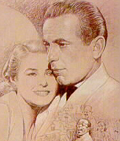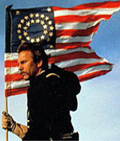|
Study Guide -
Thirteen Days (2005)
Director : Roger Donaldson
Stars :
Kevin Costner .... Kenny O'Donnell, Special Assistant to the President
Bruce Greenwood .... President John F. Kennedy
Steven Culp .... Atty. Gen. Robert F. Kennedy
Dylan Baker .... Robert McNamara, Secretary of Defense
Michael Fairman .... Adlai Stevenson, US Ambassador to the UN
Henry Strozier .... Dean Rusk, Secretary of State
Frank Wood .... McGeorge Bundy, National Security Advisor
Kevin Conway .... Gen. Curtis LeMay, Air Force Chief of Staff
Preparation :
Read the articles "Turning History on its Head" and "The Most Dangerous Moment" which are linked from the main "Thirteen Days" page
Historical/Social Significance :
"The most controversial assertion of Roger Donaldson's "Thirteen Days," an intelligent new political thriller, is that the guys who blinked were not only the Soviets, but also America's own military commanders--who backed down not from Soviet ships but from the White House." Roger Ebert
Synopsis :
The film is set during the two-week Cuban missile crisis in October of 1962, and it centers on how President John F. Kennedy, Attorney General Robert Kennedy, and others handled the explosive situation..
Guided Questions for Viewing :
Assessment questions will be based on the following :
-
Describe how the military and civilian leadership are depicted in this film?
-
What are the biases in this film? As a typical Hollywood film, Thirteen Days presents the events of the Cuban Missile Crisis from the
historical point of view of the USA. However, history is not one-sided! Look again at the key events
which you used earlier to compare with the story told in Thirteen Days. If you were retelling the story from
the point of view of the Soviets or the Cubans how would it be different? Just as we are shown the
events unfolding in the White House, there must have been similar dramas occurring in the Kremlin
and in Havana. What would the different perspectives on these events be in those two places? Would
the story still be called Thirteen Days? How, within a filmed version of the story, would the dramatic
events be shown? If we talk of heroes as an essential part of any story, how could either Castro or
Khrushchev be seen in a heroic way? (question from filmeducation.org)
-
Melvyn Leffler argues that American Cold War strategy was not just defensive reactions to Soviet aggression and provocations, but included subtle methods for achieving American domination. How does "Thirteen Days" support or reject this statement?
-
What disagreements were reflected among the principal leadership? What were President Kennedy’s main objections to his military advisers’ suggestions for the three
possible solutions to the Crisis?
-
Why would America not wish to appear ‘weak’ in the eyes of the world at this particular point in
history?
-
Thirteen Days only represents the American point of view of the Crisis. We see the Crisis develop
through the eyes of the president and his brother and also Ken O’Donnell, the presidential aide. How
are these characters presented to us? How are they made sympathetic to us as members of a film
audience?
Sources:
filmeducation.org
National Security Archive http://www.gwu.edu/~nsarchiv/nsa/cuba_mis_cri/index.htm
|



